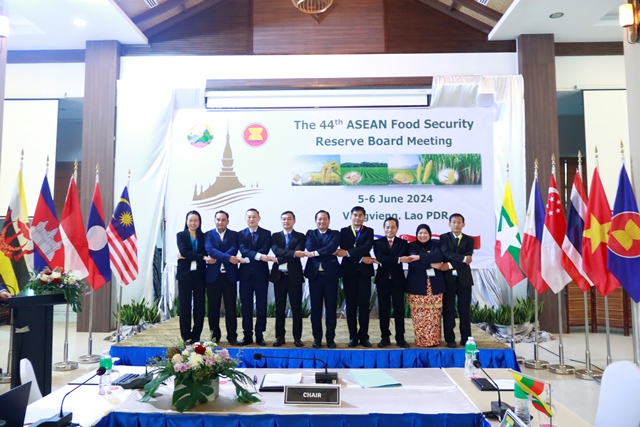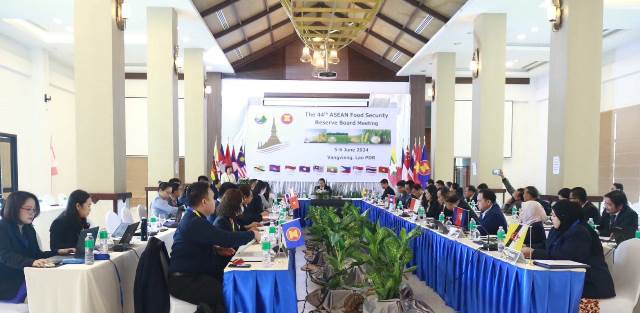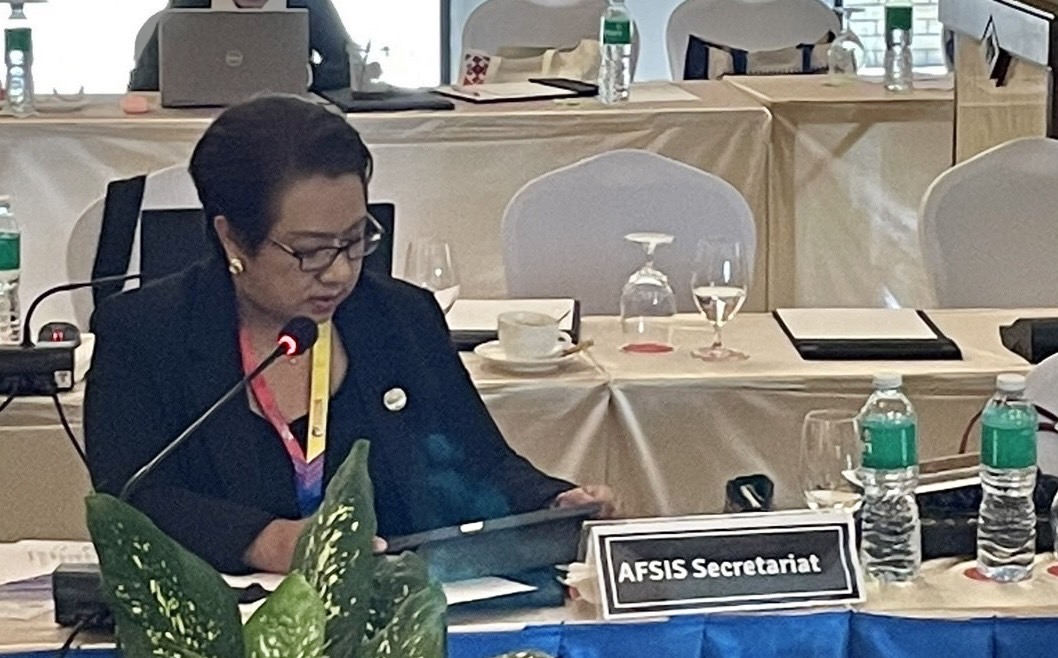
The 44th Meeting of the ASEAN Food Security Reserve Board (AFSRB) convened on June 5-6, 2024 at the AMERI Hotel in Vang Vieng, Lao PDR.
In the opening session, it was honored by Mr. Bounchanh Kombounyasith, Director General of Department of Agriculture from Ministry of Agriculture and Forestry Lao PDR. The session was attended by delegates from ASEAN Member States, including Brunei Darussalam, Cambodia, Indonesia, Lao PDR, Myanmar, the Philippines, Singapore, and Thailand as well as representatives from related organizations, including the AFSRB Secretariat, the ASEAN Secretariat, Economic Research Institute for ASEAN and East Asia (ERIA), ASEAN Plus Three Emergency Rice Reserve (APTERR) Secretariat, and the ASEAN Food Security Information System (AFSIS)Secretariat included. Sumanya Ngandee, AFSIS Manager, and Mr. Thanapat Chukaew, Agricultural Statistical Reporting Officer attended.
The objective of the meeting was to review the current status of food security, along with the challenges and opportunities faced by each country during 2023-2024. Key discussions centered on statistics related to the agriculture production, consumption, trade, and food reserves of primary crops such as rice, sugarcane, maize, and soybeans in ASEAN region, considering the impacts of climate change, rising agricultural input costs, and fluctuating supply costs.Furthermore, a presentation on the “Preliminary study on local resource-based food reserve (LRBFR)” by ERIA. The objective of LRBFR is related the increasing the overall productivity of agriculture and aiming to increase efforts to create cooperation among ASEAN member countries in sustainably maintaining food which proposes the concept note or discussion paper on the mechanism of LRBFR as proposed in the “ASEAN Leader’s Declaration on Strengthening Food Security and Nutrition in Response to Crises”.
During AFSIS's participation, Dr. Sumanya Ngandee presented the progress of the AFSIS activities for 2023 – 2024 (Q1). The report included updates on various initiatives and issues, the benefits of AFSIS data, and reports to member countries. Additionally, AFSIS informed about the future work plan, which includes a regional workshop and INAHOR activities on the SAFER project, aimed at collecting and sharing food security information of ASEAN member states and strengthening the AFSIS function emergency information sharing mechanism. Moreover, AFSIS is enhancing and progressing toward future sustainability, with the strengthening of existing roles and functions to establish AFSIS as a permanent mechanism to support food security information for ASEAN region.
The meeting concluded successfully with Mr. Bounsu Soudmaly, Deputy of Director General from Ministry of Agriculture and Forestry Lao PDR delivering to closing remark and expressing a great appreciation to all participants.




On 18 February 2026, the AFSIS Secretariat participated in the international event Google’s “Impact of AI on Global Agriculture,” organized by Google.org at Roseate House, Aerocity, New Delhi, India.

On 12-13 February 2026, the AFSIS Secretariat, in collaboration with the Japan Aerospace Exploration Agency (JAXA), the Remote Sensing Technology Center of Japan (RESTEC), Ministry of Agriculture, Forestry and Fisheries (MAFF) Japan and the Office of Agricultural Economics (OAE), Ministry of Agriculture Cooperatives (MOAC), conducted a workshop conducted a workshop The Promoting Rice Planted Area and Production Estimation Using INAHOR and Space-based Technologies in Thailand at the Meeting Room 2, Innovation Building, 3rd FL, Office of Agricultural Economics (OAE)

The In-Country Workshop on Promoting Rice Planted Area and Production Estimation Using Space-based Technologies in Lao PDR was jointly organized by AFSIS Secretariat, JAXA, MAFF Japan, and MAE Lao PDR under the AFSIS-GIS and SAFE projects. The event was held in Vientiane with hands-on training on 9 February 2026 and a workshop on 10 February 2026.
.jpg)
On 13–15 January 2026, the Office of Agricultural Economics (OAE), Thailand, in collaboration with the Ministry of Agriculture, Forestry and Fisheries (MAFF), Japan, and the AFSIS Secretariat, conducted the 1st Meeting of Japan–Thailand Expert Dialogue on Agricultural Statistics. The meeting was held at the Office of Agricultural Economics and field survey activities in Chonburi Province.